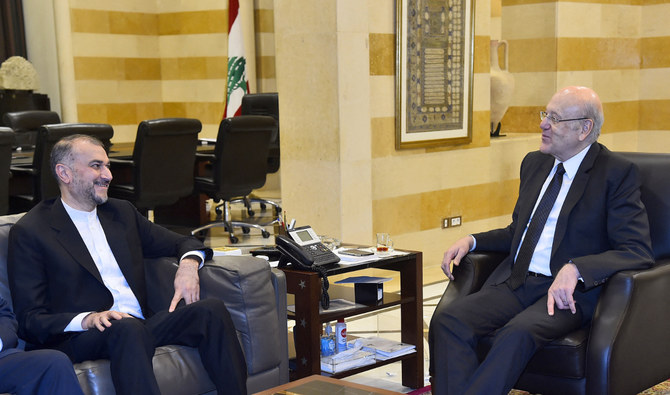BEIRUT: Iran’s Foreign Minister Hossein Amir-Abdollahian has called on Lebanon’s parliamentary rivals to overcome their political deadlock and elect a president.
However, the minister, who met with Lebanese officials on Thursday, failed to convey any Iranian initiative to resolve the country’s political crisis.
Instead, he noted that Tehran was ready to support “any agreement between the Lebanese parties regarding the presidential election.”
Amir-Abdollahian will hold a press conference on Friday to conclude his official visit to Lebanon.
The Iranian official’s visit to Beirut followed political developments in the region and the Saudi-Iranian understanding. It also falls on the 18th anniversary of the withdrawal of Syrian forces from Lebanon.
“There have been new developments in the region in recent weeks, and this will be in the interest of all the region, the Islamic world, and Lebanon,” he said.
Amir-Abdollahian said that Iran has always supported dialogue and negotiations when it comes to tension and crises in the region, and does not believe that wars are the solution to such issues.
“We are concerned about the military clashes in Sudan, and we will continue to exert our efforts and focus on strengthening peace in the region, especially in Afghanistan, Yemen, Ukraine, Sudan and Libya,” he said.
The Iranian official met with Parliamentary Speaker Nabih Berri, caretaker Prime Minister Najib Mikati, and his Lebanese counterpart Abdullah Bou Habib.
Following his meeting with Bou Habib, Amir-Abdollahian said: “We discussed comprehensive cooperation between Iran and Lebanon, and stressed our full readiness to enhance cooperation in all fields.”
He said that Iran encouraged all parties in Lebanon to speed up the presidential elections and supported any election or agreement regarding the next president.
“The officials in Lebanon, and all the parties, have the ability and the necessary competence to reach an agreement and consensus on electing a president,” he added.
Lebanese lawmakers have failed to elect a new president for six months amid continuing divisions between Hezbollah and its allies on the one hand, and MPs of parties opposing Hezbollah’s policy in Lebanon on the other.
Hezbollah insists on supporting candidate Suleiman Frangieh for the presidency, while several political parties and reformist MPs oppose this option.
Amir-Abdollahian arrived in Beirut on Wednesday on an official visit that included other countries in the region.
In a statement at Rafic Hariri International Airport, he highlighted “Iran’s strong support for the Lebanese government and people, the Lebanese army, and the resistance in Lebanon.”
He also underlined “the new, positive and constructive developments in the region,” noting that “Lebanon’s security, prosperity, well-being and progress will be in the region’s interest.”
Bou Habib said that an Iranian offer to provide assistance in the electricity sector was discussed during his meeting with Amir-Abdollahian.
Iran made an offer to Lebanese officials in 2021 to set up two power plants — one in the south and another in a southern suburb of Beirut — each providing about 1,000 megawatts, within a period of 18 months, at a low cost.
The electricity issue constitutes half of Lebanon’s financial crisis, with the total deficit in this sector over the last two decades amounting to about $36 billion, or about 45 percent of the total public debt.
However, Lebanon was reluctant to accept the offer, fearing US sanctions imposed on Iran.
Meanwhile, the ambassadors of Canada, France, Germany, Italy, Japan, the UK, US and EU issued a joint statement on the situation in Lebanon, saying: “This month marks one year since Lebanon reached a staff-level agreement or SLA with the International Monetary Fund.
“The agreement promised over $3 billion in assistance to support Lebanon’s economic recovery.
“The government pledged to quickly implement a comprehensive package of structural reforms (prior actions) in order to reach a formal agreement with the IMF.
“It is disappointing that Lebanon’s political actors have made only limited progress in implementing these prior actions,” the statement read.
The ambassadors added: “While some conditions have been met, the bank secrecy law proved insufficient, no progress has been made with respect to allocating financial sector losses, and authorities must work to audit Lebanon’s major banks and unify Lebanon’s exchange rates.
“The urgency could not be more obvious. The country faces one of the worst economic crises in modern history.
“People in Lebanon are suffering. Inflation has reached 186 percent. The Central Bank’s external reserves continue shrinking.”
They also warned: “The IMF itself has said that, if reforms are not implemented rapidly, Lebanon will be trapped in a never-ending crisis.
“With or without an IMF program, decisive structural reforms are necessary to enable Lebanon’s recovery.”
The joint statement added: “The absence of a president and an actual government is one of the great obstacles to complete reforms.
“The answers to Lebanon’s economic crisis can only come from within Lebanon and they start with meaningful reforms.
“Now is the time for the Lebanese authorities to seize the opportunity presented by an agreement with the IMF.
“Otherwise, the economy will deteriorate further, with ever more severe consequences for the Lebanese people.”
The envoys’ statement comes amid a worsening financial crisis, with value of the national currency dropping by more than 98 percent.














